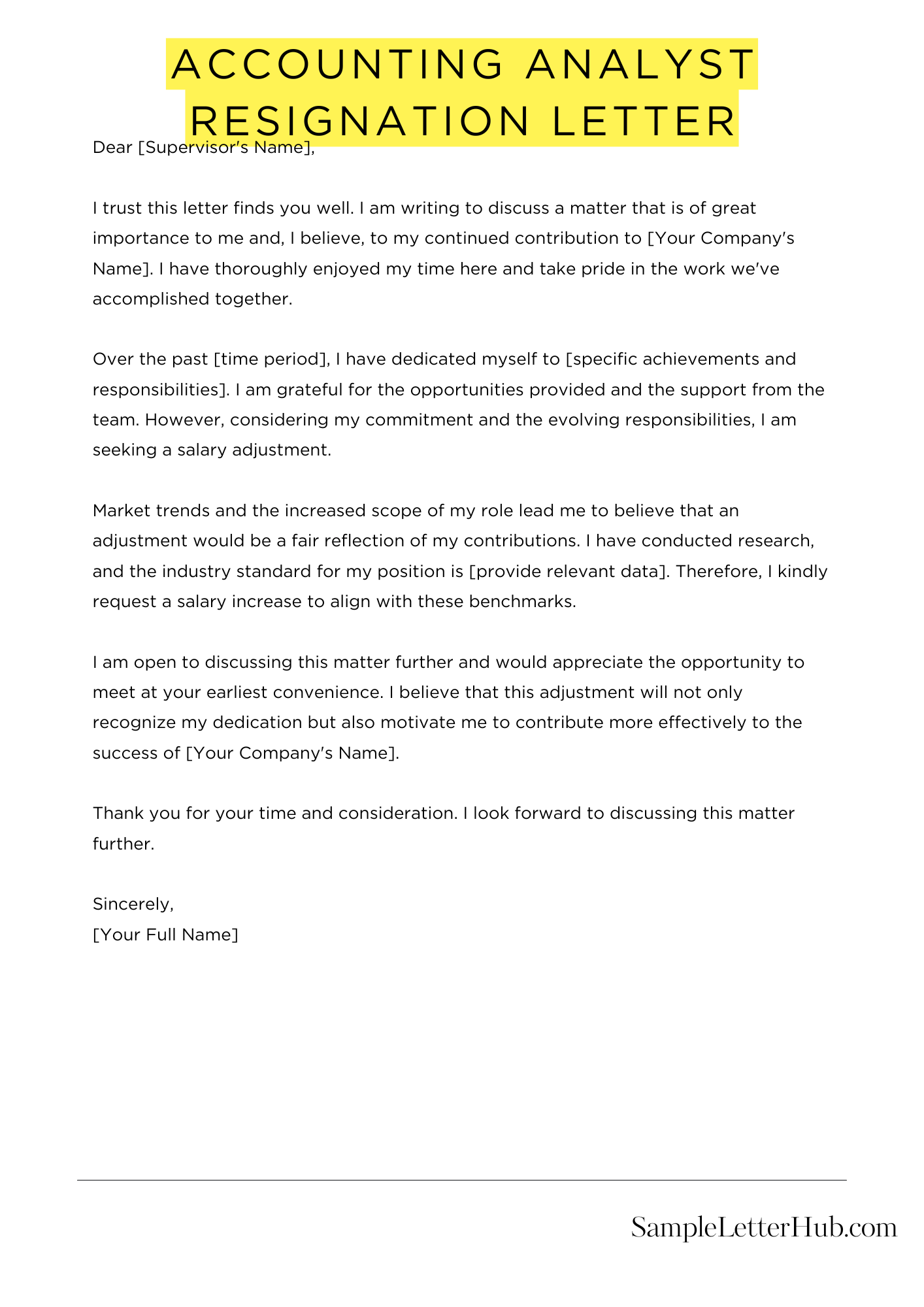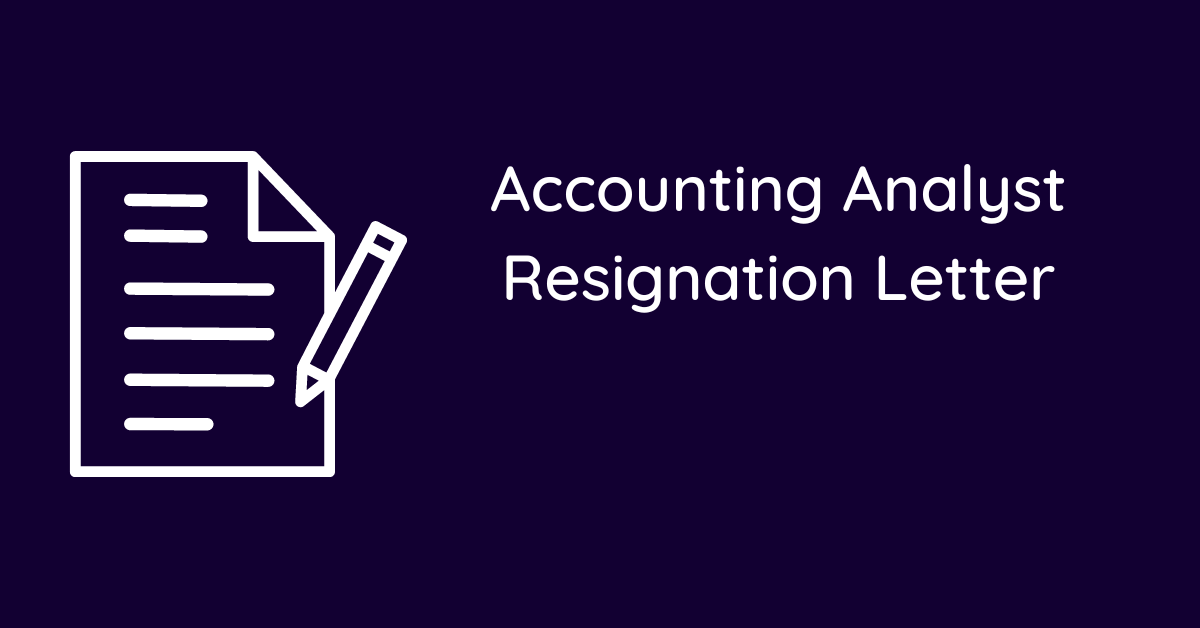When it comes to resigning from your position as an accounting analyst, it’s crucial to do so with grace and professionalism. A well-crafted resignation letter can leave a lasting positive impression on your employer and colleagues. In this article, we’ll provide you with an example of an accounting analyst resignation letter that you can tailor to your specific situation.
Remember, a resignation letter should be clear, concise, and polite. Express your gratitude for the opportunity to work at the company and highlight your key accomplishments. Keep the tone humble and professional, even if you’re moving on to bigger and better things.
Below, you’ll find a template accounting analyst resignation letter that you can use as a starting point. Feel free to adapt it to your own circumstances and add any additional details that you feel are relevant.
Accounting Analyst Resignation Letter
Dear [Manager’s Name],
Please accept this letter as formal notification of my resignation from my position as Accounting Analyst at [Company Name], effective two weeks from today, [date].
During my time here, I have gained valuable experience and developed professionally. I am grateful for the opportunities and support I have received.
I wish you and the company all the best in the future.
Sincerely,
[Your Signature]
Short Accounting Analyst Resignation Letter Sample
Please accept this letter as formal notification that I am resigning from my position as Accounting Analyst at [Company Name]. My last day of employment will be [Your Last Day]. Thank you for the opportunity to grow and learn during my time here. I wish you and the company continued success. I am happy to assist in the transition process to ensure a smooth handover of my responsibilities.
I wish you all the best with your accounting analyst resignation letter.
When it’s time to say farewell, expressing your gratitude and best wishes can make the transition smoother:

How to Write an Accounting Analyst Resignation Letter
1. Start with a Formal Introduction
Begin your letter with a formal salutation, such as “Dear [Manager’s Name].” Clearly state your intention to resign from your position as an Accounting Analyst, including your last date of employment.
2. Express Gratitude and Appreciation
Take this opportunity to express your gratitude for the opportunities and experiences you’ve gained during your time at the company. Mention specific projects or initiatives that you’ve enjoyed working on and the individuals who have supported you.
3. State Your Reasons for Leaving
While it’s not necessary to go into excessive detail, you may briefly mention your reasons for leaving. This could include pursuing a new opportunity, seeking more responsibility, or relocating for personal reasons.
4. Offer Assistance with the Transition
Demonstrate your professionalism by offering to assist with the transition during your notice period. This could involve training your replacement, providing documentation, or completing any outstanding projects.
5. End with a Positive Note
Close your letter with a positive and professional tone. Reiterate your appreciation for the company and wish them well in the future. Consider including a personal touch, such as expressing your hope to stay connected in the future.
6 Frequently Asked Questions About Accounting Analyst Resignation Letters
An accounting analyst resignation letter is a formal document that announces your decision to leave your position as an accounting analyst. It is important to write a clear and concise letter that expresses your gratitude for the opportunity to work at the company and outlines your reasons for leaving.
1. What are the most important things to include in an accounting analyst resignation letter?
The most important things to include in an accounting analyst resignation letter are:
- Your name and contact information
- The date
- The name of the company you are resigning from
- Your position
- Your last date of employment
- A brief statement expressing your gratitude for the opportunity to work at the company
- A brief explanation of your reasons for leaving
- A statement offering to help with the transition
2. How should I format my accounting analyst resignation letter?
Your accounting analyst resignation letter should be formatted in a professional business letter format. This means using a standard font, such as Times New Roman or Arial, and a font size of 12 points. You should also use single spacing and left-align your text.
3. What tone should I use in my accounting analyst resignation letter?
The tone of your accounting analyst resignation letter should be professional and respectful. You should avoid being negative or critical of the company or your colleagues. Instead, focus on expressing your gratitude for the opportunity to work at the company and explaining your reasons for leaving in a positive way.
4. How long should my accounting analyst resignation letter be?
Your accounting analyst resignation letter should be brief and to the point. It should be long enough to include all of the necessary information, but it should not be so long that it becomes difficult to read. A good rule of thumb is to keep your letter to one page.
5. What are some common mistakes to avoid when writing an accounting analyst resignation letter?
Some common mistakes to avoid when writing an accounting analyst resignation letter include:
- Being negative or critical of the company or your colleagues
- Making personal attacks
- Using unprofessional language
- Failing to proofread your letter for errors
6. What are some tips for writing a strong accounting analyst resignation letter?
Here are some tips for writing a strong accounting analyst resignation letter:
- Start by expressing your gratitude for the opportunity to work at the company.
- Briefly explain your reasons for leaving.
- Offer to help with the transition.
- Proofread your letter for errors.
Before making the decision to resign from your job, it’s essential to consider the legal aspects:
Understanding your emotions after quitting your job is important. Explore why you might be feeling sad:
Related
- Resignation letter sample
- Forced resignation letter
- Resignation letter due to going abroad
- Resignation letter due to marriage
- Resignation letter due to other opportunity
- Resignation letter due to mistake

